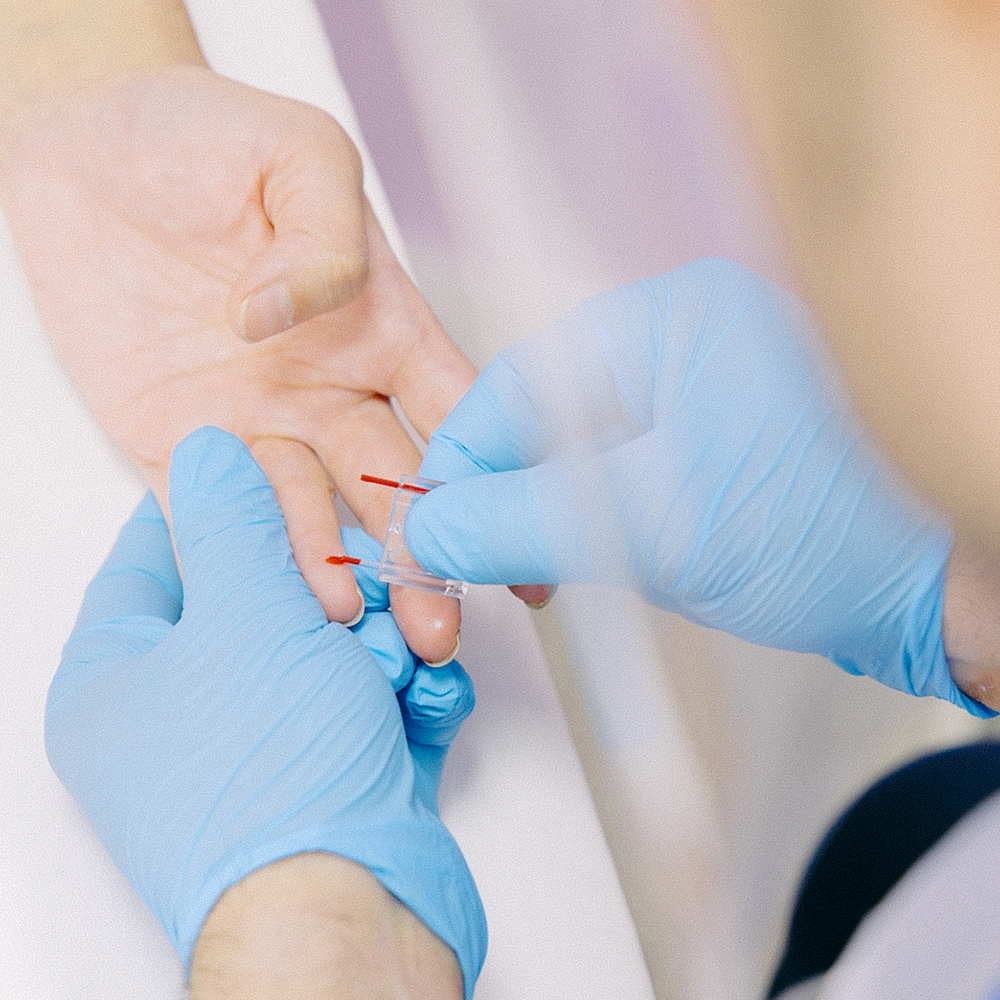Whether you are attempting to diagnose the root cause of the symptoms you are suffering from, or are monitoring testosterone levels as part of treatment, you will likely benefit from the testosterone test which is available at our walk-in clinic, this page will cover the common questions surrounding taking a testosterone test, as well as understanding what testosterone is, and how it works.

How is a testosterone test conducted?
A testosterone test can be taken through different methods, including blood, saliva, and urine. Among these, blood tests are the most commonly used method due to their high accuracy in providing results. Testosterone levels in men are highest in the morning, and can vary throughout the day, therefore for the most accurate results, it is recommended to take the testosterone test early in the morning, especially between 7am and 10am.Why should I take a testosterone test?
If you are suffering from symptoms of low testosterone including infertility, low libido, and erectile dysfunction, a testosterone test will typically be recommended to you by your doctor, however, they can be taken whenever the individual feels concerned about their testosterone levels. With women, testosterone tests are helpful in diagnosing low or high testosterone which can have a significant impact on their health, symptoms such as irregular periods, suspected tumours, PCOS, and difficulty getting pregnant may be diagnosed through a testosterone test.
How Testosterone Works
Testosterone is responsible for the development of male sex organs and secondary characteristics during puberty. In adults, it is important in the maintenance if muscle mass, bone density, and red blood cell production, outside of this it also plays a vital role in libido, mood, and cognitive function.
In both men and women, testosterone is produced in response to signals from the hypothalamus and pituitary gland in the brain, and the amount produced is regulated by a negative feedback loop. Therefore, when testosterone level rise, the hypothalamus and pituitary gland communicate to the testes or ovaries to produce less testosterone.
Can women take a testosterone test?
Although testosterone is associated with men, it is still present in women as it is an important hormone for women’s health too, and still plays the same role in sexual function, bone density, and muscle mass.
However, women have much lower levels of testosterone than men, and an excess of testosterone in women can lead to acne, male-pattern hair growth, and infertility. High levels of testosterone in women can lead to experiencing menstrual irregularities, and an increased risk of polycystic ovary syndrome (PCOS).
Conversely, low levels of testosterone in women can cause other symptoms including decreased libido, fatigue, and depressions, along with decrease in bone density, and the increased risk of osteoporosis.
What causes low Testosterone Levels?
Testosterone levels, for adult men, gradually decline with age, this typically begins after the age of 30 and is a naturally occurring process. However, the amount of testosterone in the body can also depend on other factors such as underlying medical conditions like diabetes and obesity, which can cause a decline in levels of testosterone.
Certain medications can also lead to lower levels, including:
- Opioids – Painkillers
- Statins – Lowers cholesterol
- Spironolactone – Medicine to treat high blood pressure

Naturally boosting Testosterone Levels
Various lifestyle changes and habits can naturally boost testosterone levels, while these methods may not lead to dramatic increases, they can help in optimising the amount of testosterone you are receiving, in an attempt to avoid low testosterone levels.Exercise Regularly: It has been shown that high-intensity interval training (HIT) and resistance training can increase testosterone levels.
Get Enough Sleep: Aim to get around 7 to 8 hours of sleep per night.
Maintain a Healthy Weight: Through maintaining a healthy weight, you can boost your testosterone levels, this can be achieved by regularly exercising and keeping a good diet.
Reduce Stress: Practise stress-relieving activities such a yoga, meditation, and deep-breathing to keep your cortisol level low, increasing testosterone.
Our Blood Tests:
-
B12 Vitamin injections – Out of stock
B12 hydroxocobalamin vitamin injections
View more details£23.00
-
Fitness test
The fitness screen helps you see how fit you are. This is useful before starting a weight loss or muscle building program.
View more details£191.00
View details -
Male hormone blood test
Male Hormone Blood Test checks for hormonal causes of low sex drive, muscle loss, fertility issues. Can track hormone levels & changes from diet, exercise. Tests for FSH, LH, Testosterone, Free Androgen Index, Prolactin, SHBG.
View more details£160.00
View details -
Prostate specific antigen (PSA) blood test
PSA blood test checks levels released by prostate gland. May be suitable for high risk individuals, those who have had prostate cancer treatment, or those monitoring PSA. Avoid ejaculating 2 days before test as it can temporarily raise PSA.
View more details£100.00
View details -
Testosterone blood test
Testosterone is important for reproductive, growth, and overall health in both sexes. It affects mood and prevents osteoporosis. Low testosterone in men can cause frailty, loss of libido, and bone loss. If you're on testosterone replacement therapy (TRT), this test can tell you whether your hormone levels are still within normal limits.
View more details£40.00
View details -
Ultimate Sports Performance blood test (Male)
This ultimate sports performance blood test gives insight into a multitude of biomarkers that are related to athletic performance. This is our most advanced screen for sports performance and is a great tool for monitoring your progress and gaining that performance edge. One Free online GP appointment included with this test upon request.
View more details£469.00
View details
